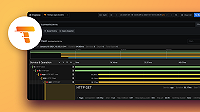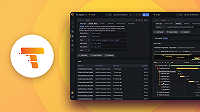This is documentation for the next version of Grafana Tempo documentation. For the latest stable release, go to the latest version.
Automatic logging: Trace discovery through logs
Running instrumented distributed systems is a very powerful way to gain understanding over a system, but it brings its own challenges. One of them is discovering which traces exist.
Using the span logs connector, you can use Alloy to perform automatic logging.
In the beginning of Tempo, querying for a trace was only possible if you knew the ID of the trace you were looking for. One solution was automatic logging. Automatic logging provides an easy and fast way of discovering trace IDs through log messages. Well-formatted log lines are written to a logs exporter for each span, root, or process that passes through the tracing pipeline. This allows for automatically building a mechanism for trace discovery. On top of that, you can also get metrics from traces using a logs source, and allow quickly jumping from a log message to the trace view in Grafana.
While this approach is useful, it isn’t as powerful as TraceQL. If you are here because you know you want to log the trace ID, to enable jumping from logs to traces, then read on.
If you want to query the system directly, read the TraceQL documentation.
Configuration
For high throughput systems, logging for every span may generate too much volume. In such cases, logging per root span or process is recommended.
Automatic logging searches for a given set of span or resource attributes in the spans and logs them as key-value pairs. This allows searching by those key-value pairs in Loki.
Before you begin
To configure automatic logging, you need to configure the otelcol.connector.spanlogs connector with
appropriate options.
To see all the available configuration options, refer to the otelcol.connector.spanlogs
components reference.
This simple example logs trace roots before exporting them to the Grafana OTLP gateway, and is a good way to get started using automatic logging:
otelcol.receiver.otlp "default" {
grpc {}
http {}
output {
traces = [otelcol.connector.spanlogs.default.input]
}
}
otelcol.connector.spanlogs "default" {
roots = true
output {
logs = [otelcol.exporter.otlp.default.input]
}
}
otelcol.exporter.otlp "default" {
client {
endpoint = env("OTLP_ENDPOINT")
}
}This example logs all trace roots, adding the http.method and http.target attributes to the log line,
then pushes logs to a local Loki instance:
otelcol.receiver.otlp "default" {
grpc {}
http {}
output {
traces = [otelcol.connector.spanlogs.default.input]
}
}
otelcol.connector.spanlogs "default" {
roots = true
span_attributes = ["http.method", "http.target"]
output {
logs = [otelcol.exporter.loki.default.input]
}
}
otelcol.exporter.loki "default" {
forward_to = [loki.write.local.receiver]
}
loki.write "local" {
endpoint {
url = "loki:3100"
}
}Examples





